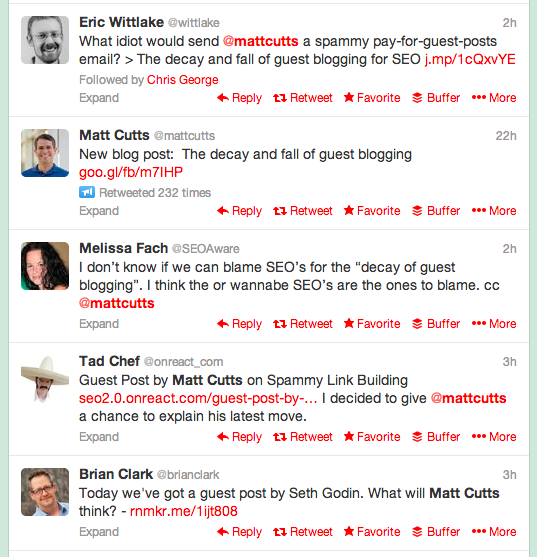Matt Cutts put it simply: Google is not psyched about guest blogging.
The MLK-day announcement sent the online community into a wild frenzy with more than 280 comments on Cutts’ blog, commentary from web thought leaders like copyblogger and searchenginejournal, and an eruption of clatter on Twitter.
The pithy main point: “…stick a fork in it: guest blogging is done.”

A screenshot of Twitter at 11:21MT for a search of
But is guest blogging really dead? Has it been put in the same category as ugly black hat tactics like content farms?
If you’re doing it simply to edge up your search rank, then probably.
But if guest posting is an important part building trust and relevance among peers, influencers and partners, then blog on friends.
Guest posting tactics devised by SEO spin-doctors are an entirely different sort than authentic guest blog posting.
Guest posting to get rich in SEO links was a bad path to begin with. Google is hyper-aware of SEO hounds, and employ powerful engineers to actually kill the “spammy” tactics one-by-one.
- Anchor Text – Dead
- Directories – Dead
- Content Duplication – Dead
- PR Articles – Dead
- Unmindful Meta tags – Dead
But for those who treat guest posting with fairness, authenticity, and genuine interest in educating and connecting with readers: guest posting isn’t dead — in fact, Cutts’ announcement may make it more alive than ever.
So What’s Next?
Continue your guest blogging with a respectable, bona fide approach. If you connect with thought leaders and industry guest bloggers who enhance your presence and theirs — Google will be happy — and your brand enhanced.
Guest blogging, before it was spamified, was originally developed as an reliable way for businesses to grow influence, educate target markets, and test new markets for relevance. This is still true.
Connecting with industry partners and various true experts in your field improves brand visibility and provides opportunities for your company to grow and learn. For one, it allows industry experts to converse with other industry experts. This provides a place for business to discover new ways of providing good customer service, business solutions, and innovative approaches, etc.
Secondly, the guest blog posts that result from these conversations are full of valuable information that your target audiences crave. Guest blogging — at its best — is a process that develops trust with consumers, provides legitimacy for your organization, and connects different industries with symbiotic advantage. Win-win-win.
In fact, as Cutts and crew work to “dim (the) view of guest blogging moving forward,” your legitimate guest blogging could fair better as the desire to sprinkle SEO fluff diminishes.
Here’s how Cutts put it:
“There are still many good reasons to do some guest blogging (exposure, branding, increased reach, community, etc.). Those reasons existed way before Google and they’ll continue into the future. And there are absolutely some fantastic, high-quality guest bloggers out there. I changed the title of this post to make it more clear that I’m talking about guest blogging for search engine optimization (SEO) purposes.”
For guest blogging SEO is not the point.
The Main Takeaways for Guest Blogging
- Be Authentic: Develop guest blogs that are authentic and meaningful to your audience
- Speak to Your Audiences: Know who your target markets are, and who you are talking to. Continue to produce content that is specific to their interests, needs, delights.
- Maintain Your Brand Credibility: When considering any SEO strategy default to authenticity. Cute tactics for better page ranks are short-sighted and almost always caught by Google. A true SEO strategy is developed around original, good, honest web presence.
- Keep Guest Blogging!: Now more than ever is a good time to develop guest blogs. Cutts’s announcement will avert any content spinmeisters, allowing the good stuff to really come through.
Bottom line: If you guest blog for friends, peers, influencers to actually share something of value, then guest blogging is alive and well.
Oh, and Matt Cutts can guest blog for us anytime.
